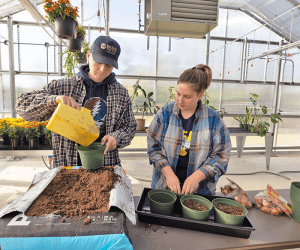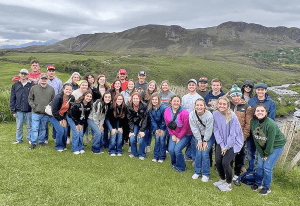Ready. Set. Grow.
"If you study agriculture or horticulture there will be several careers for you to choose from. There will always be jobs. When you graduate the question will not be, 'What kind of job can I get?' It will be, 'Who do I want to work for?'" says Bill Harmon, LLCC professor of agronomy.

Greenhouse tech
One of the fields of study within agriculture at LLCC is horticulture. A new state-of-the-art greenhouse was recently constructed for the program funded through the Kreher Farm Perpetual Charitable Trust.
The technology built into the greenhouse is designed to prepare students for what they can find in the industry today. Features include a hydroponics and irrigation system, heating and cooling controls, humidity control, shade cloths, vents for airflow and netting to aid in pest control.
“Our greenhouse provides hands-on experience that prepares our students to arrive at a job with existing training to already be one step ahead in their careers,” says Liz Conrady, instructor of agriculture and horticulture program coordinator at LLCC. “All lectures have a lab component to show students the real-life application of what they are learning.”
Careers — inside and out
“Horticulture, depending on the scale of it, can fit into anyone’s situation. You can start small for personal use or grow into a larger scale business,” says Harmon.
If you enjoy working with plants, there are opportunities to work indoors or outdoors. There are career opportunities in organic food production, native and ornamental plant production, landscaping, nursery work and turf/golf course management. “And many more opportunities are available to be an entrepreneur in horticulture compared to traditional agriculture,” adds Harmon.
In searching for a new career path, Brad Downen found the horticulture program at LLCC. “I have always enjoyed lawncare, landscaping and really all aspects of horticulture, so I thought, ‘Why not explore landscape design?’” he explains. “It’s exciting to begin something new and have the resources to learn and grow at LLCC. What I look forward to most is a rewarding, hands-on and creative career that takes place in a natural environment.”
Start here
At LLCC students can choose to study horticulture and specialize in landscape design and/or turf management. The certificate can be combined with an associate of applied science degree. The college’s agriculture program specialist, Liz Bland, is available to assist students in getting started.
In addition to hands-on training, students benefit from faculty expertise and experience, including the real-world insight of adjunct instructors who work in the industry full-time in addition to teaching horticulture. LLCC horticulture students will also complete an internship with local employers, which can then lead to employment after graduation.
“There is no one in Illinois who can offer a program with the complete package like we can here at LLCC,” says Harmon.
Taking education international

Thirty LLCC Agriculture students participated in an agriculture industry tour to Ireland this past May. Over the course of the 10-day trip, students traveled more than 1,000 miles across the countryside and explored agricultural and historical sites in Ireland.
“Travel is so important for students to be able to expand their ideas of what is possible with an ag degree. Students can see that they have a whole world of possibilities and careers waiting for them,” says Harmon.
Students visited an aquaculture company, cattle and water buffalo dairy farms, a potato and onion farming operation and packaging facility, and a sheep and dairy cow sale. They also had the opportunity to visit historical sites such as the Blarney Stone at Blarney Castle, the Cliffs of Moher, the Ring of Kerry and Rock of Cashel.
The program plans to travel in the U.S. and internationally on an annual rotation so that students have as many learning opportunities as possible both near and far from home.
Outdoor learning labs
This spring LLCC Agriculture planted a non-traditional crop for this area, sunflowers. They are more commonly raised in the Northern Plains region, not Illinois.
Aside from producing a vibrant field of flowers in the summer, sunflowers are a crop used for human food consumption such as sunflower oil, which is an alternative to vegetable oil.
“We share with our students that they must be willing to try new things and keep an open mind in agriculture in order to grow,” explains Harmon. Students took part in the planting process this past spring and participated in harvest this fall.
“As an institution, we can take chances and try new things for demonstration purposes that the average farmer may not be able to do,” says Harmon.
